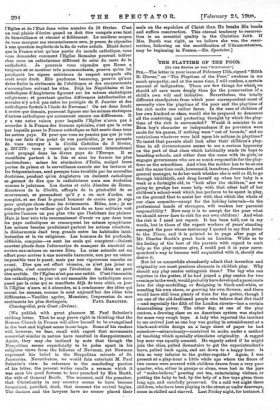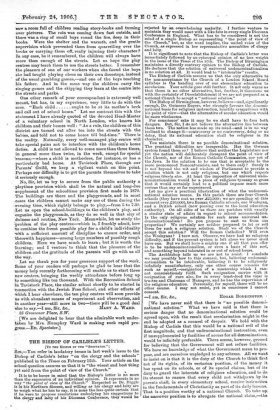THE PLAYTIME OF THE POOR4 [TO TRIO EDITOR or TRH
"SPRCTATOR.".1 SIR,—The letter in your issue of February 17th, signed "Edith H. Glover," on "The Playtime of the Poor," awakens in me much sympathy, and at the same time, I will confess, a eertain amount of indignation. There are few things for whicli we should all care more deeply than for the preservation of a child's own will and initiative. Nevertheless, the totally different standpoints from which your correspondent must of necessity view the playtime of the poor and the playtime of the rich make one rather fierce. In the case of children of her own kindred or class, would she be prepared to denounce all the contriving and protecting thought by which the play- time of the rich is surrounded P Would it minister to an Eton boy's character or independence if no provision were made for his games, if nothing were "out of bounds," and no restrictions whatever were laid upon his actions in playtime ? To insist that parents shall look after their children's play- time in all circumstances seems to me a curious hypocrisy on the part of that class which habitually sends its boys to boarding-schools, and either does the same with its girls:or engages governesses who are as much responsible for the play- time as the schooltime. And when the mother has to be at one and the same time cook, housemaid, laundress, dressmaker, and general manager, to do her work whether she is well or ill, to go through bhildbirth, and drag herself up when her baby is a week or a fortnight old, to "look after the children," are we going to grudge her some help with that other half of her children's school-week which has perforce to be spent in play, on the ground that to assist her with that which the whole of our class commits—except for the holiday intervals—to the professional hands of strangers, will weaken her parental responsibility ? How easy ills to aocept for the poor what we should never dare to risk for our own children ! And what the risk is I need not repeat. It has been told, not in my words, but in those of the expert workers of years' standing amongst the poor whose testimony I quoted in my first letter to the Times, and it is pointed to in page after page of Mr. Charles Booth's great book on London. While as to the feeling of the best of the parents with regard to such help as the play centres give, I could put it in your corre- spondent's way to become well acquainted with it, should she desire it.
But let us meanwhile abundantly admit that invention and originality are most precious elements in childish play. Why should any play centre extinguish them ? The bey who ran regattas in the gutter, if he had joined a play centre for two evenings in the week, would probably have developed a passionate love for clay-modelling, or designing in black-and-white, or mending his own shoes, or growing his own flowers; and there would have still been plenty of time for the gutter, though I am one of the old-fashioned people who believe that dirt itself —and especially the filth of the London streets—has a certain demoralising power. The other day, at one of the play centres, a drawing class on an American system was started for some very rough boys. A lady who reported the incident to me arrived just as one boy was gazing in astonishment at a black-and-white design on a large sheet of paper he had somehow—miraculously—contrived to make, under a method of teaching which specially stimulates originality. A ragged boy near was equally amazed. He eagerly asked if he might join the class, pelted downstairs to get the superintendent's leave, pelted back again, and sat down to a happy hour. Is this so very inferior to the gutter-regatta ? Again, I was present at a play-hour a little while ago where the floors of two rooms were covered with children drawn from a very poor quarter, who, either in groups or alone, were lost in the joys of "make-believe," pouring out tea, entertaining visitors, or putting the baby to bed, by the help of a few toys given them long ago, and carefully preserved. On a cold wet night these children, who have been playing in the street or under doorways, come in chilled and starved. Last Friday night, for instance, I
saw a room full of children reading story-books and turning over pictures. The rain was coming down fast outside, and there was a ring of small boys round the fire, deep in their books. Were the shelter and the warmth, and the gentle supervision which prevented them from quarrelling over the books or carrying them off, really injuring their character P In any case, be it remembered, the children will always have more than enough of the streets. Let us hope the play centres may teach them to use the streets better. I remember the pleasure of one of our workers when she found the boys she had taught playing chess on their own doorsteps, instead of the usual gambling games,—and one of the boys teaching his father. And in the same way the children carry the singing games and the skipping they learn at the centre into the streets and parks.
One other remark of your correspondent is extremely well meant, but has, in my experience, very little to do with the
case. "Each child ought to be at its mother's beck and call out of school hours." Let me contrast this with the statement I have already quoted of the devoted Head-Master of a voluntary school in North London, who knows his children and their homes well : "As a rule, the children of this district are, turned out after tea into the streets with the babies, and told not to come home till bed-time." There is the reality. Naturally, every well-managed play centre will take special pains not to interfere with the children's home duties. A child is not allowed to come more than three times, in general more than twice, in the week, except for special 'reasons,—where a child is motherless, for instance, or has a particularly bad home. At Tavistock Place, through our Parents' Guild, we keep a vigilant watch on this point. Perhaps our difficulty is to get the parents themselves to take it seriously enough.
. No, Sir, let us try to secure from the public authority a playtime provision which shall be the natural and long-due -supplement of the schooltime provision first made in 1870. The buildings are there and the playgrounds, and in most cases the children cannot make any use of them during the -evening time, which rightly belongs to play,—from 5 to 7.30. 'Let us open the school-buildings to the children's play, and organise the playgrounds, as they do so well in that city of dulness and routine, New York. Meanwhile, let us study the :problem of the play centres—which is, I frankly admit, how to canibine the freest possible play for a child's individuality 'with a sufficient amount of discipline to ensure order, and therewith happiness—among large numbers of possibly rough children. Here we have much to learn ; but it is worth the 'learning; and I venture' to think that the pleasure of the :children and the gratitude of the parents will go with us all -the way.
Let me thank you for your generous support of the work. Boma of your readers will perhaps be glad to hear that the 'money help recently forthcoming will enable us to start three new centres, bringing the weekly attendance before long up to something like ten thousand. With the Recreation School Ta,vistock Place, the similar school shortly to be started in -Connection with the Jewish Free School, and other -efforts of -Which I hear elsewhere, the ten play centres will soon provide 'us with abundant means of experiment and observation, and in another year—still more in two—there rill be a good deal [We are delighted to hear that the admirable work under- taken by Mrs. Humphry Ward is making such rapid pro- gress.—En. Spectator.]











































 Previous page
Previous page